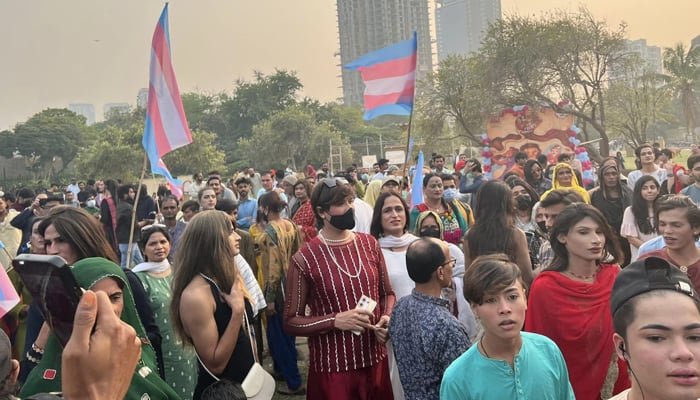Transgender persons demand end to ‘medical gatekeeping’
Transgender persons in Karachi have demanded that Khwaja Siras wishing for the X gender marker never be subjected to medical gatekeeping. Their identity is for them to define and must be respected without unnecessary barriers, they said.
In the second Sindh Moorat March, a one-of-its-kind human rights march in the city, which was held at the Frere Hall on Sunday, transgender persons demanded criminalising all forms of discrimination and hate speech based on gender identity, gender expression and sex characteristics.
The march started with a two-minute silence to show solidarity with Palestinians. They also demanded the rigorous implementation of and follow-up on reported cases, which they said are crucial for the safety and dignity of all citizens.
They demanded that murders of Khwaja Siras must not be dismissed through the Qisas and Diyat laws. “Every life is precious, and justice must not be compromised,” according to their charter of demands.
They also criticised charging extra or denying housing based on gender identity, gender expression or sex characteristics, which they said should be criminalised. They demanded incorporating designated seats for Khwaja Siras in all public transport vehicles in Sindh, reaffirming their right to safety and equality in daily commute.
They demanded enforcing the existing 0.2 per cent employment quota for Khwaja Siras in all public sectors in the province. They also demanded designing a Khwaja-Sira-specific HIV programme with dedicated funding from the government. “This programme should be governed by a body of community-based activists to ensure its effectiveness and relevance.”
They demanded revising the educational curricula to encompass the profound political and cultural history of Khwaja Siras in South Asia, along with their significant positive roles and contributions in ancient societies and empires. They also demanded including detailed and sensitive coverage of Khwaja Siras and intersex conditions in biology.
They demanded that the government not deny their lawful rights to assets and inheritance, and that legislation be in place to ensure they are treated equitably in all inheritance matters.
They also demanded to be officially recognised as a protected indigenous population, and to acknowledge and preserve their rights, cultural significance and contributions through specific legislation.
As for education, they said that public educational institutions must rigorously enforce designated quotas for Khwaja Siras, promoting equal opportunities in higher education. They also demanded banning unnecessary surgeries of intersex children without informed consent.
-
 Prince Harry Reacts As Beatrice, Eugenie's Names Surface In Epstein Emails
Prince Harry Reacts As Beatrice, Eugenie's Names Surface In Epstein Emails -
 Cyprus Joins European AI Race: What It Means For Greek LLMs And Regional Innovation
Cyprus Joins European AI Race: What It Means For Greek LLMs And Regional Innovation -
 Amazon Soon To Launch 'AI Content' Marketplace, Says Report
Amazon Soon To Launch 'AI Content' Marketplace, Says Report -
 Is AI Reliable For Health Advice? New Study Raises Red Flags
Is AI Reliable For Health Advice? New Study Raises Red Flags -
 WhatsApp Web Starts Rolling Out Voice And Video Calling For Beta Users
WhatsApp Web Starts Rolling Out Voice And Video Calling For Beta Users -
 Catherine O’Hara’s Cause Of Death Finally Revealed
Catherine O’Hara’s Cause Of Death Finally Revealed -
 Swimmers Gather At Argentina’s Mar Chiquita For World Record Attempt
Swimmers Gather At Argentina’s Mar Chiquita For World Record Attempt -
 Brooklyn Beckham, Nicola New Move Could Leave David, Victoria Reeling
Brooklyn Beckham, Nicola New Move Could Leave David, Victoria Reeling -
 Anthropic Criticises ChatGPT Ads As OpenAI Begins Testing Advertising In AI Chats
Anthropic Criticises ChatGPT Ads As OpenAI Begins Testing Advertising In AI Chats -
 YouTube Star MrBeast Acquires Step: Redefining Finance For Gen Zs
YouTube Star MrBeast Acquires Step: Redefining Finance For Gen Zs -
 Sarah Ferguson Plans Big Move To Cause ‘serious Damage’ To Andrew
Sarah Ferguson Plans Big Move To Cause ‘serious Damage’ To Andrew -
 Trump Nears 500 Press Interactions In His Second Term, Surpassing Former President Biden
Trump Nears 500 Press Interactions In His Second Term, Surpassing Former President Biden -
 Hailee Steinfeld Reveals Her Plans To Return To Music
Hailee Steinfeld Reveals Her Plans To Return To Music -
 Elon Musk Unveils SpaceX Plan For Civilian Moon, Mars Trips
Elon Musk Unveils SpaceX Plan For Civilian Moon, Mars Trips -
 MTG Commander Banned Update: Wizards Frees Infamous Instant-win Card
MTG Commander Banned Update: Wizards Frees Infamous Instant-win Card -
 Royal Family Braces For ‘final Blow’ As Andrew Scandal Deepens
Royal Family Braces For ‘final Blow’ As Andrew Scandal Deepens




